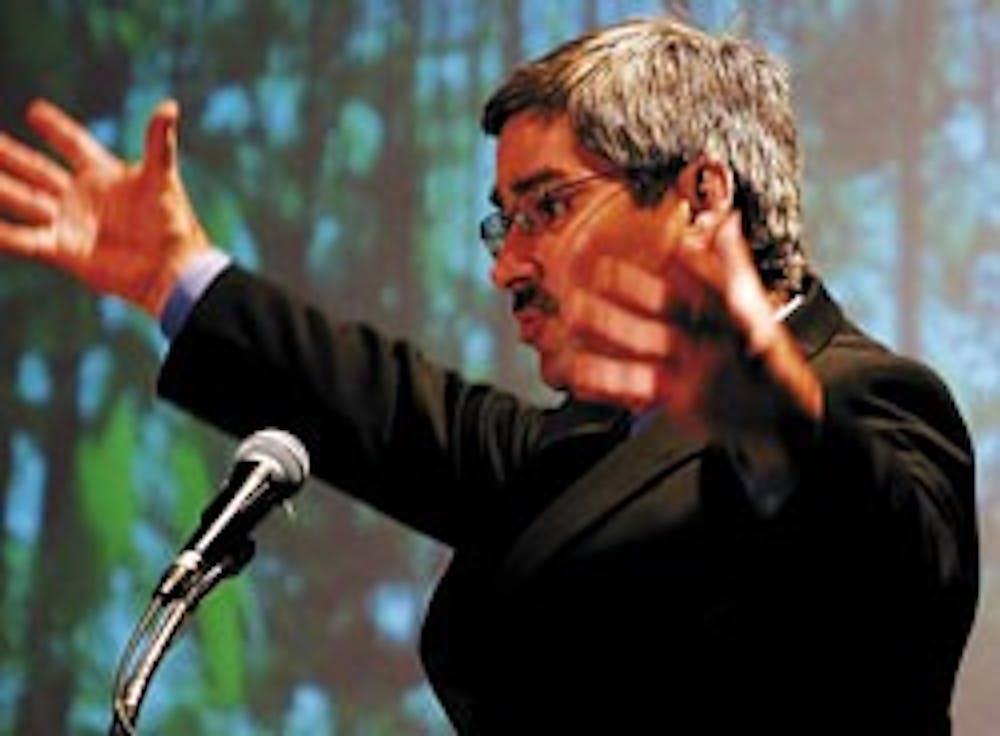by Jeremy Hunt
Daily Lobo
Jonathan Overpeck, a University of Arizona professor, said the planet is in danger if people don't take steps to reduce greenhouse gas emissions.
Overpeck is the director of the Institute for the Study of the Planet Earth at the University of Arizona.
He gave a presentation Wednesday about the greenhouse effect and climate change at the fourth annual New Mexico Drought Summit at the Continuing Education North Building.
Get content from The Daily Lobo delivered to your inbox
The greenhouse effect is when gases, mainly carbon dioxide, get trapped in the atmosphere and cause the planet to heat up, he said.
Carbon dioxide levels have been rising rapidly since the last half of the 20th century, Overpeck said.
The burning of fossil fuels by automobiles and power plants are
responsible for the increased carbon dioxide, he said.
"We are causing the warming," he said.
Overpeck said global warming is a fact, and people need to focus on how they can adapt to the climate change.
"It's no longer a big scientific debate," he said. "Eight of the top-10 warmest years have occurred in the last decade."
Overpeck said the global temperature has increased by about two degrees, which is significant, even if it doesn't sound like much.
"What used to take thousands of years to do, we're going to do in 100 years," he said.
Presenter David Gutzler, a UNM earth and planetary sciences professor, said higher temperatures will slowly overwhelm other forces, such as volcanic activity.
"Rises in temperature and ocean level are the most robust climate-change predictions," he said.
There is a costly change ahead, but people can do things to make it less severe, he said.
Overpeck cited a survey that states 72 percent of Americans agree that the federal government should address global warming by requiring industries to reduce emissions of greenhouse gases.
Gov. Bill Richardson issued an executive order in June 2005 to address climate change and reduce greenhouse gas emissions in the state.
Gutzler also spoke about the evolution of drought in the Southwest.
Despite the wet summer, people shouldn't assume the multiyear drought is over, he said.
The odds are good New Mexico will have a wet winter because of El Ni§o, but the temperature will likely be warm because of long-term warming trends, he said.
"There will be more winter rain, less winter snow," he said.
Overpeck said the biggest challenge will be dealing with drought and increased temperatures caused by the greenhouse effect.
"The West is warming faster than the rest of the country," he said.
Higher temperatures in New Mexico will lead to less snowpack, less spring runoff, drier soil and more evaporation from reservoirs like Elephant Butte, Gutzler said.
New Mexico can expect to have more forest fires, and they will be more intense, Overpeck said.
Variable weather, where there are periods of extreme moisture followed by periods of drought, makes perfect conditions for forest fires, Gutzler said.
Vegetation grows rapidly and covers the land during times of rainfall, and when the following months have little precipitation, the vegetation dries out and becomes vulnerable to fire, he said.
Gutzler said doomsday predictions about global warming leave people in an ineffective state of helplessness.
"What society needs to do is be optimistic and proactive," he said. "I am optimistic, personally, that we can manage this."
Overpeck said the federal government needs to make big changes to energy policy and develop clean-coal power plants.
"We have to plan more effectively to avoid a train wreck," he said. "The big problems are going to hit
our kids."






